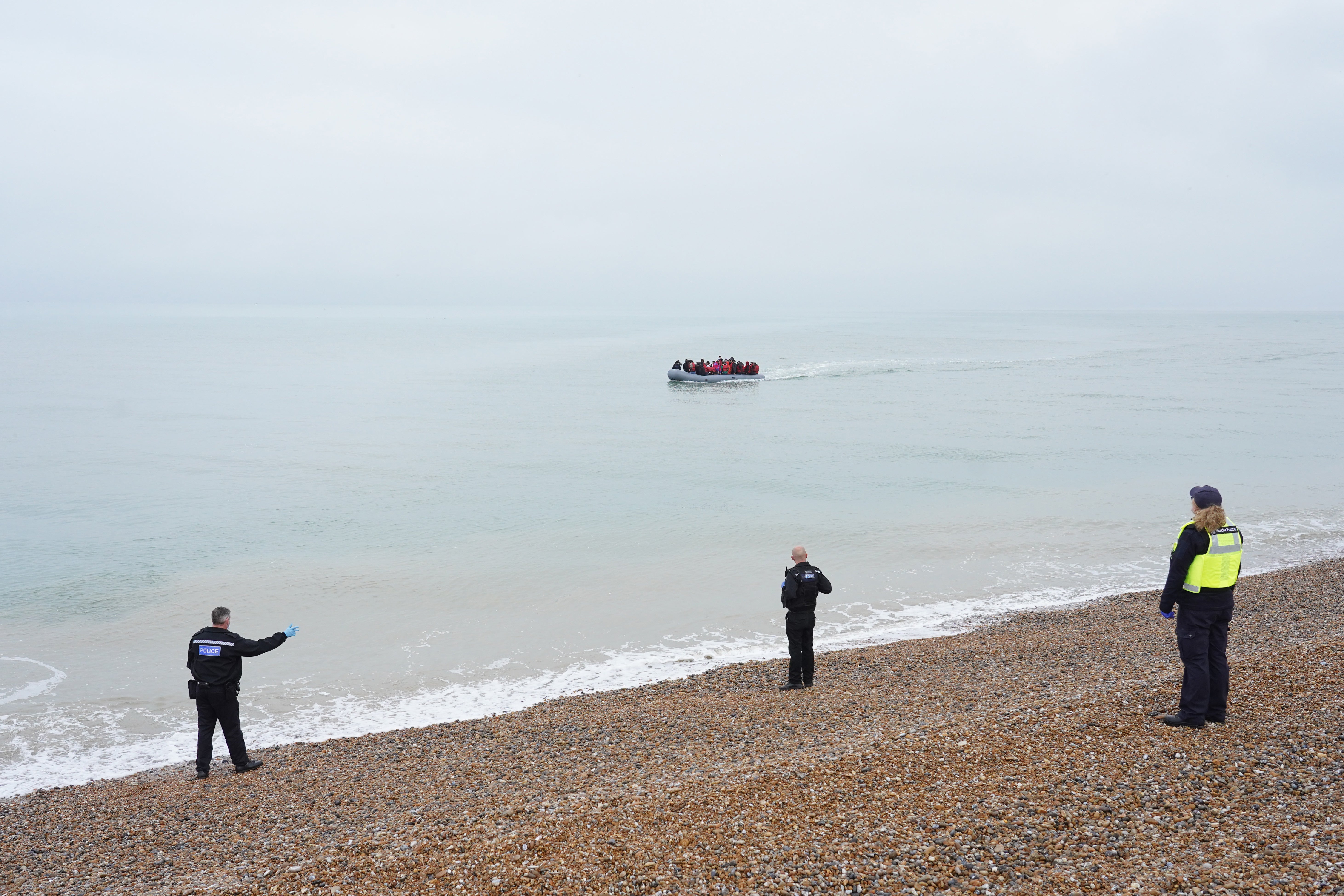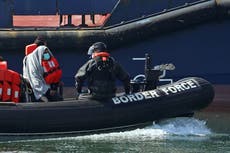Priti Patel’s claims Channel pushbacks have ‘legal basis’ questioned by House of Lords committee
Peers ‘not convinced’ policy is safe or lawful as law granting Border Force officers immunity for deaths passes through parliament

Priti Patel’s claims that there is a “legal basis” for forcing migrant boats back to France have been called into question by peers.
The House of Lords Justice and Home Affairs Committee said it was “not convinced” the plans were safe or lawful, as a law that would grant Border Force staff legal immunity over refugee deaths passes through parliament.
In a letter sent to the home secretary on Wednesday, committee chair Baroness Hamwee said the recent deaths of at least 27 asylum seekers in the Channel “starkly demonstrate” the risks at stake.
“We are not convinced, as yet, that having a policy where boats can be ‘turned around’ is safe and/or lawful,” she added.
“We are not aware that the government have published any arguments to substantiate the claim that a legal basis currently exists.”
During an evidence session held by the committee, the home secretary said the pushback policy was “based on saving lives and preventing people drowning”.
Baroness Hamwee questioned the assertion and wrote: “It is difficult to see how the practical ramifications of the tactics tally with the duty to render assistance.”
The committee asked Ms Patel to respond to a series of questions on the legal basis for pushbacks and how it complies with international law by 5 January.
Several legal challenges, including one by a union representing Border Force staff, are being launched over the policy and France has said it will not accept pushbacks.
The Independent understands that complex rules imposed by the Home Office to prevent the operations violating international law mean that pushbacks can only happen in a certain area of the Channel if numerous conditions are met.
In a statement, Baroness Hamwee said: “The so-called ‘turn around’ policy would force fragile small boats crossing the Channel to turn back. It is hard to imagine a situation in which those in them would not be in increased danger or where captains would not be obliged to render assistance.
“Instead, the home secretary has set a policy of forcing them to turn around. Even if there is a domestic legal basis, if it were actually implemented, it would almost certainly contravene the UN Convention on the Law of the Sea.”

It comes after MPs voted against an amendment to the Nationality and Borders Bill that would have prevented the powers from being “used in a manner or in circumstances that could endanger life at sea”.
The proposal, brought by Joint Committee on Human Rights (JCHR) chair Harriet Harman, was defeated by 313 votes to 235 on Tuesday night, while a series of other amendments to strengthen protections around pushbacks did not go to a vote.
Ms Harman questioned “what reason the government could possibly have to oppose the amendments”, saying they “represent what they say is their intention”.
In a report published last week, the JCHR found that planning to push migrant boats back to France was unlawful and will put lives at risk.
It said the Nationality and Borders Bill, which would grant Border Force staff partial immunity from prosecution if migrants drown during pushbacks, contained several unlawful clauses and questioned their effectiveness.
The committee warned the bill “would effectively criminalise the act of seeking asylum in the UK” by making it a criminal offence to cross the Channel via small boat, or arrive by any other means without entry clearance.
“No visa for the purposes of claiming asylum exists and it is not possible to claim asylum without coming to the UK,” the JCHR said.
“Setting up a system whereby refugees are unable to travel to the UK to claim asylum without committing a criminal offence is inconsistent with the overall purpose of the UN Refugee Convention.”
The law would leave “extremely limited” resettlement schemes as the main legal route to claiming asylum in the UK.
The committee, which contains MPs and peers from all main political parties, said the proposals must be scrapped or changed to comply with the law.
But the Nationality and Borders Bill is set to clear the House of Commons on Wednesday without any of the changes recommended by the JCHR. It will face further challenge in the House of Lords.
A Home Office spokesperson said: “As part of our ongoing operational response and to prevent further loss of life at sea, we continue to evaluate and test a range of safe and legal options to find ways of stopping small boats making this dangerous and unnecessary journey. These all comply and are delivered in accordance with both domestic and international law.
“These protections are nothing new. Border Force have existing powers to intercept vessels in UK territorial seas and an officer is not liable in any criminal or civil proceedings, if the court is satisfied that the act was done in good faith, and there were reasonable grounds for doing it.”
Join our commenting forum
Join thought-provoking conversations, follow other Independent readers and see their replies
Comments



Bookmark popover
Removed from bookmarks